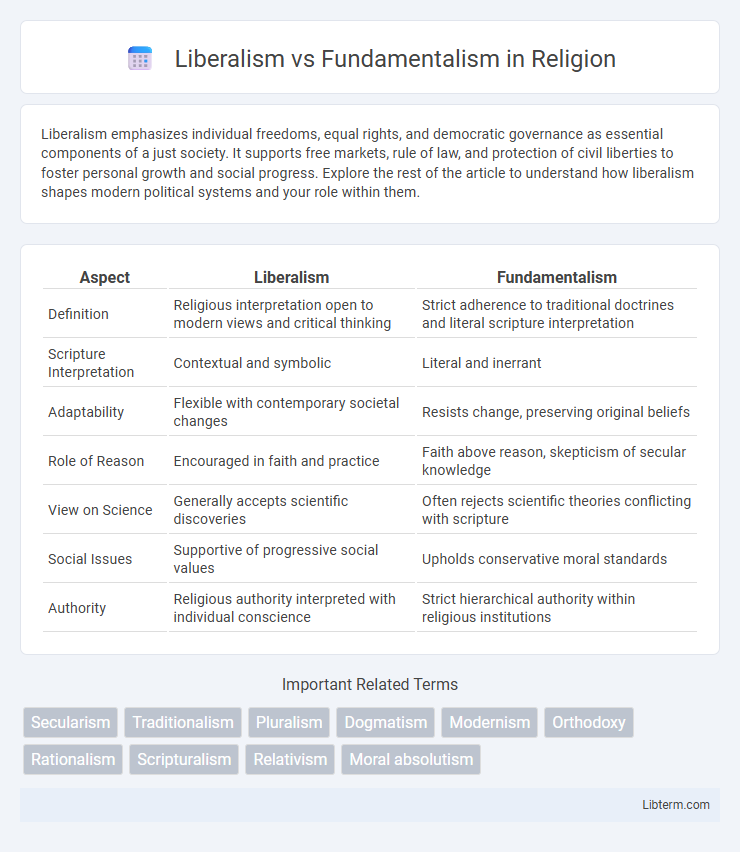Liberalism emphasizes individual freedoms, equal rights, and democratic governance as essential components of a just society. It supports free markets, rule of law, and protection of civil liberties to foster personal growth and social progress. Explore the rest of the article to understand how liberalism shapes modern political systems and your role within them.
Table of Comparison
| Aspect | Liberalism | Fundamentalism |
|---|---|---|
| Definition | Religious interpretation open to modern views and critical thinking | Strict adherence to traditional doctrines and literal scripture interpretation |
| Scripture Interpretation | Contextual and symbolic | Literal and inerrant |
| Adaptability | Flexible with contemporary societal changes | Resists change, preserving original beliefs |
| Role of Reason | Encouraged in faith and practice | Faith above reason, skepticism of secular knowledge |
| View on Science | Generally accepts scientific discoveries | Often rejects scientific theories conflicting with scripture |
| Social Issues | Supportive of progressive social values | Upholds conservative moral standards |
| Authority | Religious authority interpreted with individual conscience | Strict hierarchical authority within religious institutions |
Introduction to Liberalism and Fundamentalism
Liberalism emphasizes individual rights, equality, and democratic governance, advocating for progressive social policies and open markets. Fundamentalism strictly adheres to traditional beliefs, often rooted in religious or ideological texts, resisting modern interpretations and social change. Both ideologies shape political and cultural landscapes by promoting contrasting views on authority, liberty, and societal progress.
Historical Origins and Evolution
Liberalism originated during the Enlightenment in the 17th and 18th centuries, emphasizing individual rights, reason, and secular governance as responses to absolute monarchies and religious dogma. Fundamentalism emerged in the late 19th and early 20th centuries, particularly within Protestant Christianity, as a reaction to modernist interpretations and secularism, advocating a strict adherence to perceived original doctrines. Both ideologies have since evolved, with liberalism promoting pluralism and democracy, while fundamentalism often resists cultural and scientific changes, maintaining a focus on doctrinal purity.
Core Philosophies and Belief Systems
Liberalism emphasizes individual freedom, equality, and reason, advocating for progressive social change and democratic governance based on human rights and secularism. Fundamentalism insists on strict adherence to traditional religious doctrines, resisting modern interpretations and promoting a return to original texts as absolute truths. These contrasting belief systems shape diverse approaches to law, morality, and societal organization, influencing global political and cultural landscapes.
Political Implications and Governance Models
Liberalism advocates for individual rights, democratic governance, and pluralism, promoting inclusive institutions that balance power and protect freedoms. Fundamentalism often supports strict adherence to religious or ideological doctrines, influencing governance through centralized authority and limited political pluralism. The political implications of liberalism foster open societies with separation of powers, whereas fundamentalism tends toward theocratic or authoritarian regimes that prioritize ideological conformity over civil liberties.
Social Attitudes and Cultural Values
Liberalism emphasizes individual freedom, tolerance, and progressive social attitudes, advocating for equal rights and diversity in cultural values. Fundamentalism centers on strict adherence to traditional beliefs, often opposing social change and promoting conservative cultural norms based on religious or ideological doctrines. Social attitudes in liberalism support inclusivity and secularism, whereas fundamentalism champions authority and conformity to established moral codes.
Views on Religion and Secularism
Liberalism advocates for a secular state where religion and government operate independently, promoting religious pluralism and individual freedom of belief. Fundamentalism insists on the integration of religious doctrines into political and legal systems, often rejecting secular frameworks as incompatible with divine law. The clash between Liberalism's embrace of secularism and Fundamentalism's enforcement of religious authority shapes ongoing debates about governance and individual rights.
Educational Approaches and Intellectual Openness
Liberalism in education promotes critical thinking, intellectual openness, and encourages diverse perspectives, fostering an environment where students explore ideas freely and question traditional beliefs. Fundamentalism often emphasizes rigid adherence to specific doctrines, limiting critical inquiry and prioritizing established truths over alternative viewpoints. The contrast significantly impacts curriculum design, teaching methodologies, and students' ability to engage with complex social and philosophical issues.
Economic Perspectives and Policy Preferences
Liberalism champions free markets, advocating minimal government intervention to promote individual economic freedoms and innovation, emphasizing deregulation, open trade, and competition. Fundamentalism often supports protectionist policies, favoring government control to uphold traditional economic structures and resist globalization, prioritizing economic stability over market liberalization. These divergent views shape policy preferences, with liberalism pushing for globalization and market efficiency, while fundamentalism leans toward economic nationalism and regulatory oversight.
Liberalism vs Fundamentalism in Modern Society
Liberalism in modern society emphasizes individual rights, secular governance, and progressive social policies, contrasting sharply with fundamentalism's focus on strict adherence to traditional beliefs and religious doctrines. The tension between these ideologies often shapes debates on education, law, and human rights, influencing political and cultural discourse globally. Liberalism advocates for pluralism and inclusivity, while fundamentalism typically resists change to preserve perceived moral and social order.
Challenges, Conflicts, and Future Prospects
Liberalism faces challenges from fundamentalism due to conflicting values on individual freedom versus strict adherence to religious or ideological doctrines, often leading to social and political conflicts. The tension between secular governance favored by liberalism and the theocratic ambitions of fundamentalism creates friction in legal systems, education, and human rights policies. Future prospects depend on fostering dialogue and mutual understanding to bridge divides, promoting coexistence while respecting pluralism and diversity.
Liberalism Infographic

 libterm.com
libterm.com